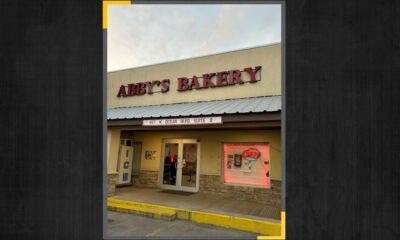Mississippi Today
Mar-Jac settles with OSHA over teen worker’s death

The company that operates a Hattiesburg poultry plant where a 16-year-old employee died last year while cleaning a machine has settled with the federal agency tasked with worker safety.
Mar-Jac Poultry agreed to pay nearly $165,000 in fines and implement safety measures to protect employees from well-known machine hazards, the U.S. Department of Labor announced Wednesday.
The night of July 14, 2023, Duvan Perez was cleaning a deboning machine at the plant when the machine turned on and pulled him in, Occupational Safety and Health Administration found in its investigation of the incident.

“Tragically, a teenage boy died needlessly before Mar-Jac Poultry took required steps to protect its workers,” OSHA Regional Administrator Kurt Petermeyer said in a statement. “ … Enhanced supervision and increased training can go a long way toward minimizing risks faced by workers in meat processing facilities.”
In addition to addressing the violations, the company must implement several enhancements relating to the use of lockout/tagout standards, which are procedures to shut down equipment before maintenance and other activities are performed. The enhancements include training, a risk and hazard assessment of current procedures and monthly audits for its use on the sanitation shift for a year.
Earlier this year, OSHA cited Mar-Jac for 17 violations relating to Perez’s death, with 14 classified as serious and proposed over $212,000 in penalties. Records also show the company issued at least eight citations at the Hattiesburg plant between 2020 and 2021 – incidents that included deaths, amputations and other injuries.
“Mar-Jac was aware of these safety problems for years and had been warned and fined by OSHA, yet did nothing. Hopefully, Mar-Jac will follow through this time so that no other worker is killed in such a senseless manner,” Biloxi attorney Jim Reeves, who represents Perez’s family, said in a Friday statement.
Perez’s family filed a wrongful death lawsuit against Mar-Jac, agency Onin Staffing and others in February. As of Friday, that case is ongoing in the Forrest County Circuit Court.
Federal child labor laws prohibit anyone under the age of 18 from working in meat processing plants because of the dangerous machinery.
Mar-Jac and other defendants, such as the staffing agency that placed Perez at the plant, denied the allegations of the lawsuit.
In a statement released shortly after the teenager’s death, Mar-Jac said staffing companies are responsible for verifying employee’s age and identification. Additionally, an attorney for Mar-Jac told NBC News last year that the teenager used identification of a 32-year-old man to get the job.
Perez’s case was also highlighted in the NBC documentary about child labor in slaughterhouses.
This article first appeared on Mississippi Today and is republished here under a Creative Commons license.![]()
Mississippi Today
Senate passes its income tax cut plan
Senate passes its income tax cut plan
The Senate voted Monday evening to pass a tax cut that reduces the state income tax and the sales tax on groceries while raising the gasoline tax, setting up negotiations with the House.
The measure passed the GOP-majority Senate 34-15, with four Democrats supporting it and four Republicans opposing it. It now heads to the House, whose leadership is advocating for its own plan, which would eventually eliminate the state individual income tax.
The Senate plan amounts to a net tax cut of $326 million, a more modest sum than the $1.1 billion net cut passed by the House. The Senate would reduce the state’s flat 4% income tax to 2.99% over four years, while the House would eliminate the income tax over more than a decade.
Senate Finance Chairman Josh Harkins, a Republican from Flowood, told reporters that the legislation was a responsible way to cut taxes while slightly increasing the gasoline tax to provide more revenue for infrastructure funding.
“I think we’ve put forward a really good plan that helps families at the grocery store by lowering the sales tax on groceries,” Harkins said. “And it provides incentives and rewards work.”
The Senate plan would reduce the state’s 7% sales tax on grocery items, the highest in the nation, to 5% starting July 2025. Municipalities receive a portion of grocery tax revenue, and the Senate plan would make cities whole.
The Senate bill would raise the state’s 18.4-cents-a-gallon gasoline excise by three cents yearly over the next three years, eventually resulting in a 27.4 cents-per-gallon gas tax at completion. This is an effort to help the Mississippi Department of Transportation with a long-running shortfall of highway maintenance money.
Most of the chamber’s Democratic members opposed the plan over fears that the state could not afford to wipe out around half a billion dollars each year from its budget and still address some of the state’s critical issues such as public education and health care.
“That’s a lot of money, and we need that money for basic infrastructure,” Democratic Sen. Hob Bryan of Amory said. “Everyone benefits from infrastructure.”
Some Democratic members attempted to amend the bill to eliminate the grocery tax or change the tax structure to avoid increasing the gas tax. But the GOP-majority chamber on party-line votes defeated the amendments.
Four Republican senators voted against the final measure because it raised the gasoline tax, something they viewed as going against the GOP’s core ideology.
Sen. Angela Burks Hill, a Republican from Picayune, told reporters the gas tax increase would hurt rural people the most because they have to drive further for work and to purchase groceries.
“I’m just trying to follow my party’s platform of low taxes,” Hill said.
Now that both chambers at the Capitol have passed separate tax proposals, the key question will be how much legislative leaders can compromise on a final package. House Speaker Jason White, a Republican from West, and Republican Gov. Tate Reeves have said abolishing the income tax is their primary goal this session.
White previously told Mississippi Today that he’s willing to compromise with the Senate, but he wants a final tax cut that’s substantive and meaningful.
“We’re not interested in a small piece of a tax cut while not addressing other issues,” White said.
Reeves has thrown cold water on the Senate’s proposal because it doesn’t entirely eliminate the income tax. If lawmakers can’t agree on a proposal, he could call them into a special session to address taxes.
Harkins, though, said he hopes lawmakers can “build consensus” on a final package during the regular session. House and Senate leaders will likely debate the measure for the next month. The deadline for lawmakers to approve tax and appropriations bills is March 31.
This article first appeared on Mississippi Today and is republished here under a Creative Commons license.![]()
Mississippi Today
City goes to the suburbs, and Germantown is the winner
City goes to the suburbs, and Germantown is the winner

Can’t tell you how many times I’ve been asked this question in recent years: What has happened to Jackson Public Schools basketball?

Good question.
And I do know the answer, at least a large part of it. But first some background.
Used to be, you could count on several JPS powerhouses to bring huge crowds to the State Tournament at Mississippi Coliseum every February to watch Murrah, Lanier, Provine, Callaway and Jim Hill teams that annually produced some of the greatest basketball talent in Mississippi history. Often, fire marshalls stepped in and locked the Coliseum doors with still hundreds of fans outside hoping to get in.
That’s no longer the case. Not a single JPS boys team made it to the State semifinals this year. (The Lanier girls will play Choctaw County in a 4A semifinal game Wednesday afternoon.) Even just a decade ago, no JPS boys teams in the State Championships would have been heresy. This is not to say that the Jackson metro area is not represented at the Big House. Northwest Rankin, Brandon, Germantown and Madison Central teams all played in the semifinals on Monday. The Canton girls and boys will play Tuesday.
The suburbs are killing it. Inner city Jackson is not.

OK, so here’s a major reason why: In many cases, the city has moved to the suburbs. This is best illustrated by how the Germantown team from out Gluckstadt way hammered Biloxi 55-30 in the Monday noon Class 7A semifinals.
There were Germantown guards Michael and Mason Williams controlling the flow of the game with their ball-handling, passing and defensive skills. There was 7-footer Sam Funches IV dominating the paint at both ends with his length, nifty footwork and soft touch around the basket. There was guard/forward Michael Johnson contributing in so many ways with hustle and grit. And there was Devin Moore, a sturdy, 6-5 guard/forward scoring nine points on just five shots and also contributing five rebounds, three assists and two steals.
Here’s the deal: Michael Williams (a senior) and Mason Williams (a junior) are the sons of Mo Williams the former Murrah, Alabama and NBA great who now coaches at Jackson State. Funches is the son of Sam Funches III, who also played at Murrah, was recruited by Jim Calhoun at Connecticut and finished his career at North Texas. Johnson’s dad, Trey, played at Murrah and then was the SWAC Player of the Year at Jackson State before a long professional career in the NBA and overseas. Moore’s dad and an uncle both played at Jim Hill. Now, all live in Madison County and have turned the Germantown Mavericks, 23-5, into a powerhouse. The Mavs will play neighboring Madison Central in the 7A championship game, which will be played Thursday night at 8 p.m.
Said Mo Williams, who watched Monday’s proceedings from a seat in the Germantown cheering section, “It’s pretty obvious, isn’t it? It’s like the city has moved to the ‘burbs.”
We weren’t three minutes into the Germantown-Biloxi game when brothers Michael and Mason Williams combined to make a play that reminded we longtime Jackson-area fans of the kind of plays their daddy made at Murrah. Mason lofted a high, looping alley-top pass high above the basket. Michael , who will play for his dad at Jackson State, soared high above the rim and slammed the ball through to give the Mavs a lead they never relinquished.
Michael dunked again moments later, swished a three-pointer after that, and then scored on a spin move and a mid-range jumper seconds later. Before you knew it, a 7-6 deficit turned into at 21-11 lead,
Meahwhle, Funches IV, a 16-year-old junior, showed why virtually every college basketball coach in the country is recruiting him. Yes, he needs to get stronger. He could be – and probably will be – more aggressive. But you can’t teach a kid how to be 7 feet tall, and you can’t teach the deft shooting touch he already possesses. That’s inherited. These Germantown players inherited well.
This time last year, Mo Williams’ sons were helping Jackson Academy win the overall private schools state championship at Jackson Academy. Now they are trying to win a public schools championship.
Michael asked me: “Has anybody ever done that?”
I don’t know. I thought Andy Kennedy, the former Ole Miss and current UAB coach, might have done it back when he still had hair and transferred from Winston Academy to Louisville High School. But Kennedy text-messaged back: ”We won it at Winston but only won the north half at Louisville, got beat in the semifinals at the Coliseum.”
Somebody else might have done it. I don’t know. I do know precious few have had the opportunity.
This article first appeared on Mississippi Today and is republished here under a Creative Commons license.![]()
Mississippi Today
On this day in 1956

Feb. 24, 1956

U.S. Sen. Harry F. Byrd Sr. coined the term “Massive Resistance” to unite white leaders in Virginia in their campaign to preserve segregation. The policy appealed to white Virginians’ racial views, their fears and their disdain for federal “intrusion” into the “Southern way of life.”
Virginia passed laws to deny state funds to any integrated school and created tuition grants for students who refused to attend these schools. Other states copied its approach.
When courts ordered desegregation in several schools in Charlottesville and Norfolk, Virginia Gov. James Lindsay Almond Jr. ordered those schools closed. When Almond continued that defiance, 29 of the state’s leading businessmen told him in December 1958 that the crisis was adversely affecting Virginia’s economy. Two months later, the governor proposed a measure to repeal the closure laws and permit desegregation.
On Feb. 2, 1959, 17 Black students in Norfolk and four in Arlington County peacefully enrolled in what had been all-white schools.
This article first appeared on Mississippi Today and is republished here under a Creative Commons license.![]()
-

 News from the South - Louisiana News Feed4 days ago
News from the South - Louisiana News Feed4 days agoJeff Landry’s budget includes cuts to Louisiana’s domestic violence shelter funding
-

 News from the South - North Carolina News Feed4 days ago
News from the South - North Carolina News Feed4 days agoBills from NC lawmakers expand gun rights, limit cellphone use
-

 News from the South - West Virginia News Feed18 hours ago
News from the South - West Virginia News Feed18 hours ago‘What’s next?’: West Virginia native loses dream job during National Park Service terminations
-

 News from the South - Texas News Feed4 days ago
News from the South - Texas News Feed4 days agoICE charges Texas bakery owners with harboring immigrants
-

 News from the South - Oklahoma News Feed6 days ago
News from the South - Oklahoma News Feed6 days agoRemains of Aubrey Dameron found, family gathers in her honor
-

 News from the South - Florida News Feed6 days ago
News from the South - Florida News Feed6 days agoTrump says AP will continue to be curtailed at White House until it changes style to Gulf of America
-

 News from the South - Texas News Feed6 days ago
News from the South - Texas News Feed6 days agoTexas Senate bill would give teachers raises, free pre-K
-

 Mississippi Today4 days ago
Mississippi Today4 days agoForty years after health official scaled fence in Jackson to save malnourished personal care home residents, unchecked horrors remain












































